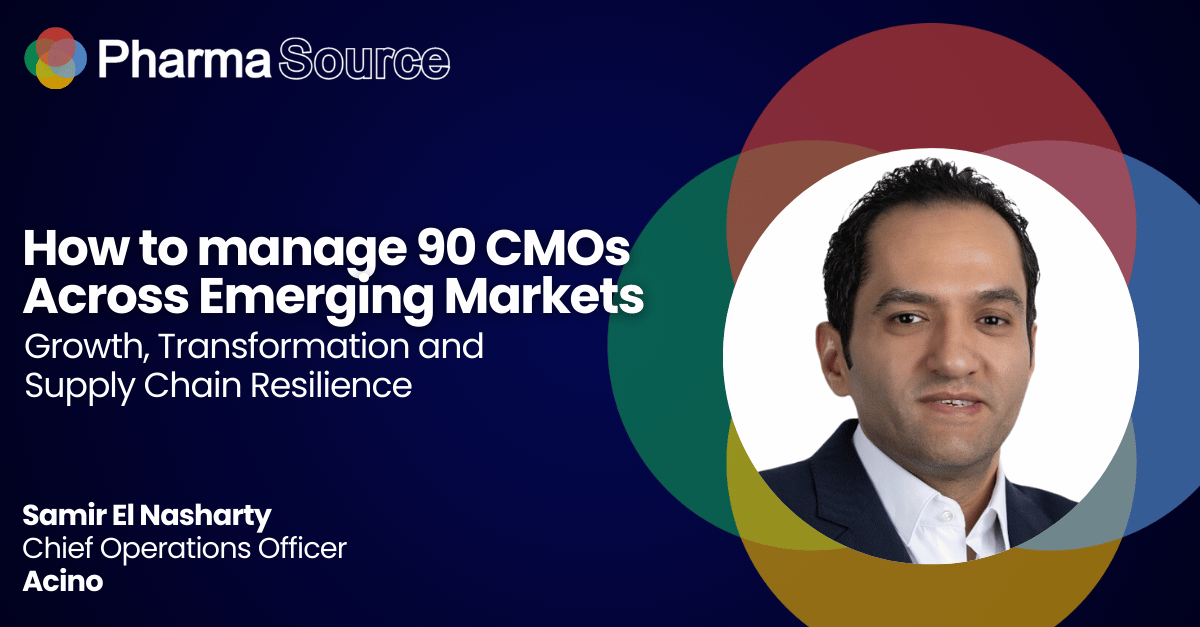“In underserved markets, there’s always a challenge of reaching patients due to political and economic pressures. Through smart packaging, logistics, and distribution, we’re committed to providing healthcare solutions across our network of more than 100 distributors,” says Samir El Nasharty, Chief Operations Officer at Acino.
Samir El Nasharty leads an experienced global team of over 1,000 Tech Ops professionals at Acino, a Swiss pharmaceutical company established in 1836. As part of the Arcera Life Science platform, established by ADQ, an Abu Dhabi-based investment and holding company, Acino focuses on delivering high-quality pharmaceutical products to emerging markets across the Middle East, Africa, Ukraine, CIS, and Latin America.
Speaking to the PharmaSource podcast at CPHI Milan, Samir provides detailed insights into managing complex manufacturing networks, implementing digital transformation initiatives, and steering the company’s strategy through challenging market conditions while ensuring consistent medical supply to underserved regions.
Complex Manufacturing Network Management
Acino’s manufacturing capabilities span an impressive network of six manufacturing sites across the Middle East, Europe, and Africa, supplemented by 90 contract manufacturing organizations (CMOs) and hundreds of material suppliers. This extensive network enables the company to supply various therapeutic areas, including CNS, pain management, and cardiovascular medicines across more than 50 countries.
“Managing such a vast network requires a structured approach,” Samir emphasizes. “We’ve established what we call our ‘external supply organization’ to ensure end-to-end management of our entire network. The key lies in four fundamental principles:
- Implementing a standardised approach across all operations
- Clearly understanding and meeting business expectations
- Maintaining focus on patient needs
- Managing CMO relationships as strategic partnerships”
The complexity of managing 90 CMOs across different locations and contract terms requires careful orchestration. “Strategic partnership is the cornerstone of successful CMO management,” Samir explains. “We view our CMOs not just as suppliers but as integral partners in our mission to serve patients.”
Digital Transformation and Innovation
Digital transformation stands as a crucial strategic pillar for Acino’s operations, with several key initiatives underway. The company’s digital lab initiative represents a significant step forward in modernizing pharmaceutical manufacturing processes.
“Our digital lab implementation is transforming how we approach quality control and testing,” Samir details. “The primary objectives are:
- Eliminating non-value-adding tests
- Removing unnecessary paper-based processes
- Streamlining the full testing workflow from raw materials to finished products
- Optimizing distribution processes”
While the digital lab initiative currently focuses on in-house manufacturing sites, Acino is actively sharing insights with CMO partners. “By helping our partners digitalize their processes, we create a mutually beneficial relationship that ultimately improves product quality and accessibility,” Samir notes.
Geographic Expansion and Market Strategy
Acino’s growth strategy includes significant geographic expansion through strategic partnerships and acquisitions. Recent moves include, the
- Acquisition of M8 Pharmaceuticals in Latin America
- Integration of Pharmax in the Middle East
- Expansion of distribution networks across emerging markets
“These strategic moves strengthen our innovation portfolio and expand our geographical footprint,” Samir explains. “We’re particularly focused on markets where we can make a significant impact on patient access to medicines.”
Supply Chain Resilience
“While some companies continue to face challenges due to inflation and regional political situations, we’re seeing strong recovery trends,” Samir observes. “The key is maintaining supply chain resilience through our comprehensive end-to-end network.”
To ensure consistent supply in challenging markets, Acino maintains a comprehensive approach to supply chain management. This includes:
- Integrated manufacturing network management
- Robust quality organization
- Advanced logistics systems
- Smart packaging solutions
- Strategic distribution partnerships
“Our focus on supply chain resilience ensures timely product delivery to patients across our diverse market footprint,” Samir concludes. “By maintaining strong relationships with our partners and continuously improving our processes, we can better serve patients in underserved markets.”
Future Trends and Strategic Focus
Looking ahead to 2025 and beyond, Samir identifies several crucial market trends shaping the industry:
- Personalized Medicine: “We’re seeing increased focus on cell and gene therapy, specialty products, and personalized therapeutic approaches.”
- Digital Transformation: “Continued investment in innovation and digital tools remains crucial for future growth.”
- Strategic Partnerships: “Expanding geographically through strategic partnerships helps strengthen our innovation portfolio and market presence.”












 Stay ahead of trends and best practices
Stay ahead of trends and best practices
